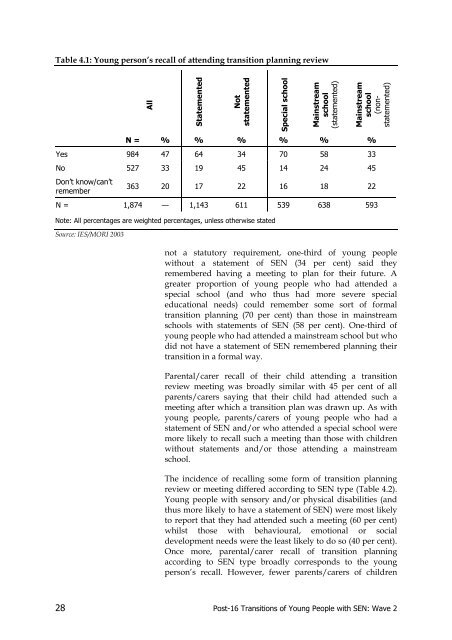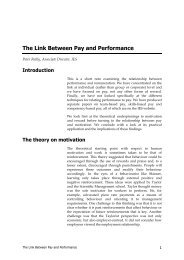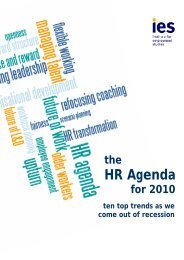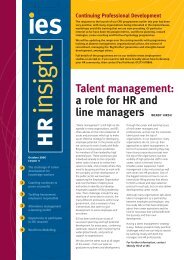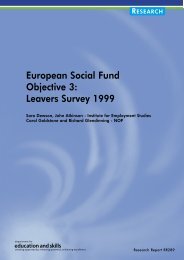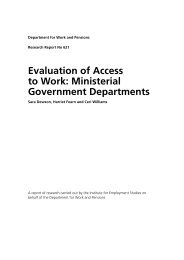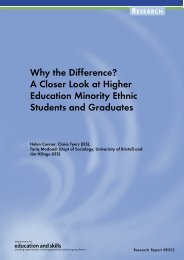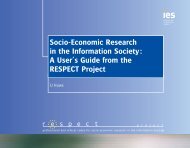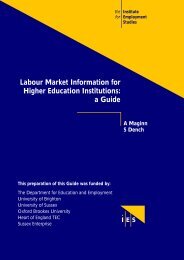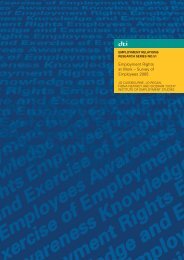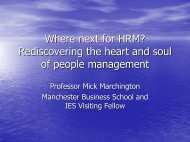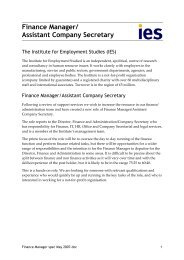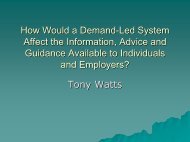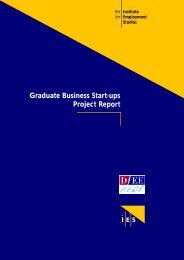Post-16 Transitions: a Longitudinal Study of Young People with ...
Post-16 Transitions: a Longitudinal Study of Young People with ...
Post-16 Transitions: a Longitudinal Study of Young People with ...
You also want an ePaper? Increase the reach of your titles
YUMPU automatically turns print PDFs into web optimized ePapers that Google loves.
Table 4.1: <strong>Young</strong> person’s recall <strong>of</strong> attending transition planning review<br />
All<br />
Statemented<br />
Not<br />
statemented<br />
Special school<br />
Mainstream<br />
school<br />
(statemented)<br />
Mainstream<br />
school<br />
(nonstatemented)<br />
N = % % % % % %<br />
Yes 984 47 64 34 70 58 33<br />
No 527 33 19 45 14 24 45<br />
Don’t know/can’t<br />
remember<br />
363 20 17 22 <strong>16</strong> 18 22<br />
N = 1,874 — 1,143 611 539 638 593<br />
Note: All percentages are weighted percentages, unless otherwise stated<br />
Source: IES/MORI 2003<br />
not a statutory requirement, one-third <strong>of</strong> young people<br />
<strong>with</strong>out a statement <strong>of</strong> SEN (34 per cent) said they<br />
remembered having a meeting to plan for their future. A<br />
greater proportion <strong>of</strong> young people who had attended a<br />
special school (and who thus had more severe special<br />
educational needs) could remember some sort <strong>of</strong> formal<br />
transition planning (70 per cent) than those in mainstream<br />
schools <strong>with</strong> statements <strong>of</strong> SEN (58 per cent). One-third <strong>of</strong><br />
young people who had attended a mainstream school but who<br />
did not have a statement <strong>of</strong> SEN remembered planning their<br />
transition in a formal way.<br />
Parental/carer recall <strong>of</strong> their child attending a transition<br />
review meeting was broadly similar <strong>with</strong> 45 per cent <strong>of</strong> all<br />
parents/carers saying that their child had attended such a<br />
meeting after which a transition plan was drawn up. As <strong>with</strong><br />
young people, parents/carers <strong>of</strong> young people who had a<br />
statement <strong>of</strong> SEN and/or who attended a special school were<br />
more likely to recall such a meeting than those <strong>with</strong> children<br />
<strong>with</strong>out statements and/or those attending a mainstream<br />
school.<br />
The incidence <strong>of</strong> recalling some form <strong>of</strong> transition planning<br />
review or meeting differed according to SEN type (Table 4.2).<br />
<strong>Young</strong> people <strong>with</strong> sensory and/or physical disabilities (and<br />
thus more likely to have a statement <strong>of</strong> SEN) were most likely<br />
to report that they had attended such a meeting (60 per cent)<br />
whilst those <strong>with</strong> behavioural, emotional or social<br />
development needs were the least likely to do so (40 per cent).<br />
Once more, parental/carer recall <strong>of</strong> transition planning<br />
according to SEN type broadly corresponds to the young<br />
person’s recall. However, fewer parents/carers <strong>of</strong> children<br />
28 <strong>Post</strong>-<strong>16</strong> <strong>Transitions</strong> <strong>of</strong> <strong>Young</strong> <strong>People</strong> <strong>with</strong> SEN: Wave 2


